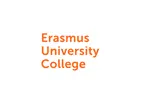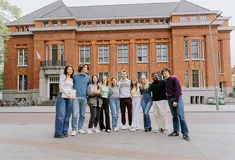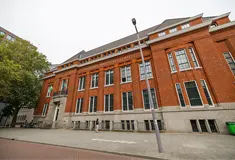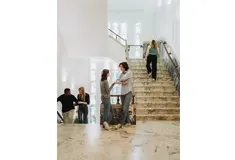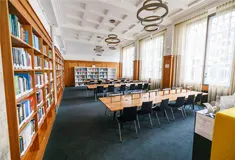About Humanities, BSc - at Erasmus University College, Erasmus University Rotterdam
At the end of their first year at EUC, students declare their Major, which is a central component of the curriculum. It consist of a comprehensive set of courses (75 EC) that builds a solid foundation in a particular discipline. Each Major will be concluded with a capstone project, in which a Major-related topic of the student's choice will be explored under the guidance of a supervisor. In addition to the Major, students have the option to choose an EUC Minor (30 EC). At EUC, you can choose from the following Majors:
Humanities
The major Humanities combines Political Philosophy and Critical Theory on the one hand and Cultural Studies and Medium Analysis (Literature, Arts, Photography, Film, Television, Social Media, etc.) on the other.
The curriculum is structured around four recurring themes – technology, economy, culture and politics – that are combined in innovative courses rooted in our intellectual heritage. Students thus gain extensive knowledge of, and learn to critically reflect on, the historical processes and social developments as well as the institutions and interfaces that have shaped today’s world and continue to shape the 21st century.
The majors and minors in the Humanities Department are designed to educate the critical thinkers, cultural entrepreneurs, ethical managers and informed citizens of tomorrow. They will open a wide variety of diverse career paths to our students in fields such as academia, the cultural sector, media & communication or the creative economy.
Moreover, the intellectual versatility, the capacity to reflect on and see through complex problems and the reading and writing skills acquired in and through the humanities will benefit our students in whatever position they may find themselves later on in their lives. As medical doctors they will be trained in assessing ethical dilemmas; as managers they will be able to critically reflect on their own judgments and those of others; as CEOs or entrepreneurs they will be able to formulate inspiring visions while taking their feasibility into account; and as politicians they will be able to convincingly convey their message and find flaws in the opponent’s rhetoric. An education in the Humanities is therefore pivotal to any professional in our fast-changing and highly complex 21stcentury.
Cultural Analysis
The major in Cultural Analysis offers students an interdisciplinary approach to the critical analysis of contemporary culture. In the field of cultural studies, culture is defined as a constantly changing set of practices, to which meanings are given by the members of a society or group. These meanings are constructed, and structure the way people behave. Through the study of cultural phenomena, such as works of art and literature, TV & cinema, digital media, and popular culture, as well as the social, economic, political and historical contexts in which they are situated, students learn to analyse culture, with the aim to critically question its implied normativity. The major also provides students with a range of theoretical perspectives from which to approach cultural texts, by drawing from history and medium-specific-, aesthetic-, critical-, post-colonial- and feminist theory. In doing so, this major provides students with the critical tools to read cultural texts, and in addition makes visible the position of the researcher, in this case the students themselves, as situated in a specific cultural context which influences their own meaning making. This is a key skill for critical world citizenship in the twenty-first century. The major in Cultural Analysis prepares students for further studies in the fields of art history and cultural theory, media and cultural studies, and visual culture.
Political Philosophy and Critical Theory
The major Political Philosophy & Critical Theory aims to provide a broad but focussed programme that addresses the most relevant traditions in continental political thought of the past 500 years. In addition, it aims to bring into focus the tradition of critical thinking that emerged in the mid-19th century – including its many influences on, and adaptations by, other critical academic disciplines – along with the influence of this kind of thinking on contemporary academic and public debates.
In the courses on political philosophy, the focus is on such diverse issues as the notion of rights, sovereignty, governance, political institutions, freedom and equality, justice, democracy, and many others. Early Modern Political Philosophy, Contemporary Political Philosophy, and Modernity span Western political thought that emerged during the Renaissance up to the most recent and more internationally oriented theoretical perspectives on democracy and politics (i.e., from Machiavelli, Spinoza, Montesquieu and Rousseau, via Kant, Hegel and Marx, to Kelsen and Schmitt, Rawls, Habermas and Laclau). The course Aesthetics and Politics shows the intrinsic relationship between political theory and art theory from Ancient Greece (Plato, Aristotle) to Modernity (Schiller, Wagner).
The critical theoretical line of this major revolves around the academic traditions that were initiated in the 19th century, with critiques of modern society, industrial capitalism and its accompanying bourgeois liberal culture (from Marx, Nietzsche and Freud). We focus on the continuation of this way of thinking in the works of scholars from the Frankfurt School (Adorno, Horkheimer, Marcuse), the French tradition that emerged in Vincennes, Paris (Foucault, Deleuze, Guattari, Rancière) and the Birmingham School (Williams, Hall, Gilroy). Other lines of critical thought that students will become acquainted with in this major are the perspectives of feminist philosophy and post-colonial theory, by reading texts from crucial feminist thinkers such as de Beauvoir, Butler, bell hooks and Haraway; and influential post-colonial authors such as Fanon, Said and Spivak.
In general, this major prepares students to reflect critically on the history of the present, but also equips them to analyse their own time and their possible immediate future(s). For example, in the course Late Modernity students critically reflect on pressing issues in the here and now, such as neoliberalisation, precarisation, the debt economy, mediatisation and the climate crisis.


